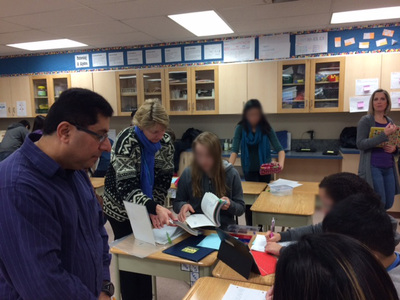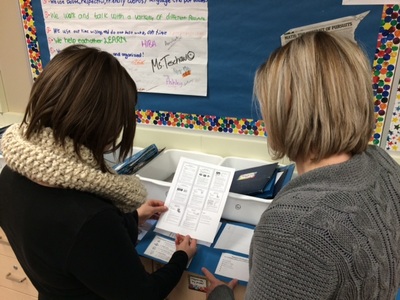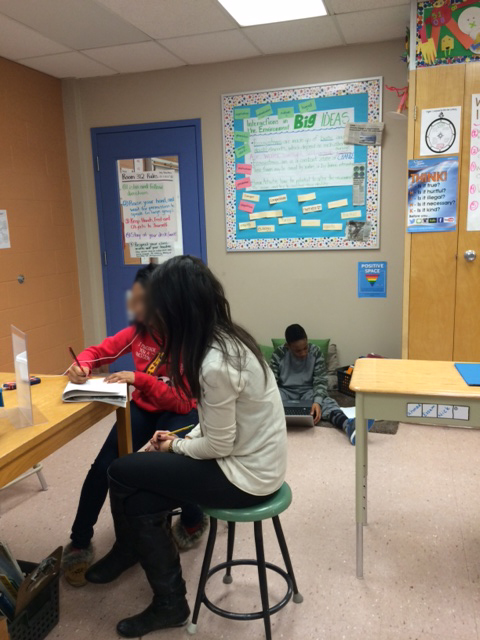Math teachers at the Grades 7 - 10 level have been grouped from various schools, and given release time to meet, dialogue and plan. Although the first and fourth meetings for all the groups were centrally and therefore content-identical, the middle two sessions were at the discretion of the teachers and their facilitators (coaches, interested administrators, etc.)
Classroom Visits
The group I was a part of decided to spend our first self-directed day visiting our family of schools' secondary school, in order to see where our students would be spending their days once they were done with us in a year or two. The morning was spent on classroom visits; in the afternoon we debriefed and planned a communication lesson together as a team.
Our second self-directed day was spent at my school, where the group visited several classrooms, including my own, to see where their students were coming from.
Breadth of Teaching Styles
One of the biggest learnings for the group was the range and diversity of classroom experiences that students were exposed to: From the differentiated "Centers" model I am experimenting with this year to more traditional classrooms where students spend most of their time sitting in rows at their desk taking notes and responding to fast-paced, teacher directed lessons, and everything in between, I think our secondary colleagues were really amazed at the variety of teaching styles they saw in one building!
For me, this most recent visit was a positive one on two counts: First, the group seemed really engaged in my classroom -- the teachers were supposed to visit for about half a period or so, and then move on to other classrooms before our debrief discussion.
But they wouldn't leave! The teachers stayed in my room for almost a double period, interacting with students, observing, asking questions, taking photographs, and just generally enjoying and contributing to the positive buzz in the air. I could sense that my students -- many of whom in that particular cluster are on IEPs -- were also proud to show of their developing math skills and work focus in front of other adults.
Debriefing: Considering Questions & Addressing Concerns
The last time a group visited, I was not released to be part of the debrief discussion, so I was not able to alleviate concerns about the release of control and sharing of power that a teacher has to do if she wants to run a program like mine.
This time I was able to consider and respond to questions my team had for me. Several of the teachers expressed amazement that these allegedly "behaviour", "LD", "Autism" and other needs-featuring students were so on-task and engaged with what they were doing. This was our third go at "Math Centers", and the management part of things seems to finally be falling into place; it was marvelous for both me and my visitors to see everyone working at different learning tasks and at a variety of levels as they engaging in various patterning and algebra-related problems, computer lessons, visual tasks, manipulatives explorations and vocabulary studies.
Cross-Pollination
The second positive outcome of this network day for me was that visiting other classrooms allowed me, too, to marvel at and celebrate the collegiality amongst colleagues.
Although I sometimes regret that we are not a more cohesive staff pedagogically and program-wise (we do not always collaborate on specific lessons at my school, and even as a grade level team, I would not say that we have a clear, cohesive vision), we most certainly share resources, and I never feel like people are judging one another for their choice of teaching style. We all recognize the extensive challenges that a large, busy middle school offers, and we respect one another's autonomy and professionalism in choosing how to best meet those challenges in our individual classrooms.
How marvelous that such diverse teaching styles can coexist and function harmoniously to meet the needs of a wide range of learners in the school. I always feel comfortable asking questions, and am appreciative that people freely share resources which I can edit and personalise for my own classroom. I am grateful to be part of this diverse staff.
| | |
I am also grateful for the opportunity to have been part of this numeracy network; I feel like although we didn't necessarily do "concrete", specific planning together, there was a lot of cross-pollination of our multiple meetings, and I have a much better sense of the secondary curriculum than I did previously. I also feel like I have a professional network of people I can turn to with questions or more general professional dialogue. Already we have shared numerous links and resources, and as a result of the network, I have reworked some of my assessment materials, learning goals and success criteria for various units, and am considering various technology integrations and solutions. (Unfortunately, I have neither well functioning devices in my room, nor well-functioning, reliable wifi, so that will be a bit of a slow process...)
Overall, this was good professional soul food, and I feel more inspired to continue and extend the math and growth mindset work I am doing in my classroom. I'm looking forward to our final, large group meeting in February, and I hope to be able to continue as part of the network next year.





 RSS Feed
RSS Feed